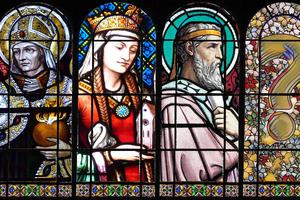Heed St. Thomas Aquinas’ Advice and Learn More Catholic Theology
Book Pick: The How-To Book of Catholic Theology

The How-To Book of Catholic Theology
By Father John P. Cush
OSV, 2020
232 pages; $18.95
To order: OSVCatholicBookstore.com
“Three things are necessary for the salvation of man: to know what he ought to believe; to know what he ought to desire; and to know what he ought to do. ― St. Thomas Aquinas
If you want to follow St. Thomas Aquinas’ advice, and learn the basics of theology in an easy-to-grasp way and see how it applies to your faith and life, The How-To Book of Catholic Theology by Father John Cush is the place to start.
“If any of these describe you, then guess what? You have the making of a really good theologian!” Father Cush writes of the signposts most people interested in the faith fit into. One signpost asks, “Do you like to study about your faith, pick up a book and read, perhaps the Catechism of the Catholic Church, trying to figure out what exactly the Church teaches and why?”
“What do I need to start my study?” he then asks, answering, “What I always say to the prospective student is pretty simple: First, have faith in Christ and in his Church; second, pray; third, be a person or reason; and, fourth, place all of your study at the service of God and his Church.”
The book’s subtitle aptly describes what appears throughout this work: Everything You Need to Know but No One Ever Taught You.
Even the quick introduction to the types of theologians — the academic theologian in the classroom, the theologian in the streets who is the “man or woman of faith who is most concerned with bringing the faith that they have, and the theology that they have studied, into the direct pastoral service of God’s people,” and the theologian in the chapel —is clearly understood. Dorothy Day is an example of the “theologian in the streets,” while St. Thérèse of Lisieux is a “theologian in the chapel.”
The priest proceeds to explain the two fundamental tools of theological methods: “the fonts of Divine Revelation — Sacred Scripture and Sacred Tradition.”
When it comes to using these tools, Father Cush, who is academic dean and formation adviser at the Pontifical North American College in Rome as well as a theology professor, illustrates with informative examples.
Plus, he covers a bit about theology’s specializations, which adds to the overall picture.
In one especially enlightening section, Father Cush takes readers through the different ways popes from Blessed Pius IX through Pope Francis approach theology.
Take Benedict XVI, for whom “… theology is all about falling in love with Jesus, who is our friend. In friendships, the more we come to know others in time spent with them, the closer our friendships will be. Pope Benedict offers us the example of a man, priest, bishop, and a theologian who is a friend of Jesus, and in his writings, wants us to become friends with Jesus too!” writes Father Cush.
One of the highlights of this book are the author’s aphorisms scattered throughout, such as, “The single most important part of being a theologian is … you have to have faith.” As he also writes, “I cannot emphasize enough the absolute necessity of being a person of faith and the absolute necessity of a personal and ecclesial adherence to the Person of Jesus Christ if one wishes to study theology successfully.”
And, when explaining the Blessed Sacrament, he states: “In reality, the question as it is often posed to Catholics — ‘What is the Eucharist?’ — is not valid. The interrogative pronoun used is wrong. The question should be, ‘Who is the Eucharist?’”
He also delves into the wisdom of Fathers of the Church because, as one subhead puts it, “All of Theology Is Kept in the Fathers.” Father Cush emphasizes, “And all the truly great Catholic theologians of the twentieth and twenty-first centuries rely on the Fathers of the Church, along with Sacred Scripture, as the basis for their theology. You can’t really do Catholic theology without them!”
The bonus in this section: the 10 reasons why everyone should read the Fathers of the Church.
In addition, Father Cush gives a brief description of each of the Gospels. “What a gift we have in all the Gospels,” he notes, “but especially in St. Luke’s, the Gospel with the details that only a mother could know [Earlier he said, ‘This Gospel is considered to be the Gospel of Our Blessed Mother. It is thought that Our Lady was the one who told Luke details that only a mother could know, intimate details about the family history and background of her side of the family.’], the gospel of mercy (look at Luke 15:11-32 the parable of the prodigal son and the merciful father), the Gospel of the poor, the Gospel of the women, the Gospel of the Gentiles — indeed, the Gospel of the Lord!”
A plus for the reader: “Suggestions for Building a Catholic Library.” In addition, there are sections on theological books (no surprise, it begins with a good Catholic study Bible), Catholic spiritual classics, Catholic fiction and Catholic fiction classics of Western civilization. Father Cush offers thumbnail descriptions of each and conversationally insightful reasons for reading them.
And, of course, the theological trustworthiness of the saints is underscored. As he writes, “You can trust the theology of someone who has the title ‘Saint’ in front of his or her name. Good theology can arise only out of holiness of life. This is a truth that can be seen throughout history.”
Amen!
- Keywords:
- st. thomas aquinas
- catholic theology














